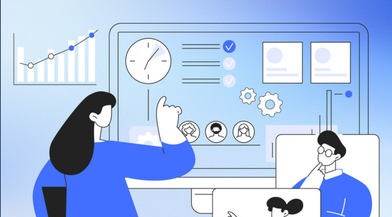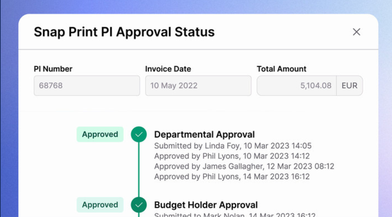
Some decision makers and business owners, including many in the Accounting and Audit profession, still have reservations about the usefulness of the Cloud in improving their efficiency and operations or those of their clients’ businesses. It could be just another passing ‘fad’ invented by the IT profession to liven up their revenue prospects in the face of reluctance to change existing systems. Others are certain that it will have as great an impact on the organisation and competitiveness of medium-sized enterprises as did the introduction of PC based systems to small businesses, which effectively put paid permanently to the many “Bureau” services that preceded them.
In this final document in our series exploring Cloud Accounting, we discuss the benefits the Cloud can bring and show how this is already reshaping businesses. Regardless of the arguments for and against Cloud Computing in general, there is now very strong evidence of a fast and increasing take-up of this technology by businesses and now, most especially, as a platform for accounting services, which has significant implications for the Accountancy and Audit professions.
Part 1 – An Introduction to the Cloud
Part 2 – A look at Cloud Security
Part 3 – Analysing the Cost Savings of Cloud Computing
Part 4 – Cloud Accounting: Radically Changing the way we work
There’s absolutely no doubt that Cloud Computing has already had a big impact on many businesses. The evidence is there for all to see. The traditional local Travel Agency business is all but wiped out as a result of Customers now having direct access to research and an ability to book relevant products on-line. Bookstores are decimated through the advent of Amazon and E-Readers. More and more music is being downloaded from iTunes to the detriment of high street retailers. Most trade publications have now moved on-line. AirBnB is disrupting the lower cost Hotel and Bed & Breakfast businesses and Netflix, et al, is likely to severely disrupt the traditional TV channels delivery model. And what about Uber and Halo! Banking has been transformed (most banks use a private Cloud, but it’s still Cloud Computing).
It’s all around us with more and more businesses adopting Cloud strategies, and many more in the pipeline. There is a revolution going on in the way business is now being conducted, with significant disruption to the traditional model of many businesses and equally significant opportunities opening up for new businesses, or indeed, for new ways of conducting business for existing companies. And all of this has happened before credible Cloud Accounting solutions, a relative recent innovation, became available. This too is presenting great opportunities, and also threats, to established practices in the way that business is transacted, transactions processed and management information presented, and savvy business operators and their accountants are adopting it to achieve competitive advantage.
Collaborative Accounting
In addition to the many benefits described in the earlier Articles in this series, one of the most overlooked benefits of Cloud Accounting is its ability to facilitate Collaboration, both between systems using Webservices for easy integration and between system’s users via anytime, anywhere access. Let’s look at a few examples:
Accountants providing outsourced services to their Clients using traditional Desktop based packages have a problem in this area. If the client is looking after the prime books, the accountant cannot do any end-of-month Journal Postings, reconciliations, allocations, budget comparisons etcetera until there is a hand over of the account system files from the Client. This usually takes the form of an electronic file transfer, usually unencrypted backups sent via email, or even exchange of physical media like CDs – both potential security risks. Once the accountant has control, it creates difficulties for the Client who has to suspend normal posting of new transactions until the Practice has finished its work and returns the adjusted system files. If they continue posting they risk overwriting any new postings since the last transfer when the returned transferred file is restored. Of course, there are elaborately conceived procedures to avoid these shortcomings, but using a Cloud based system both parties can Collaborate simultaneously without interfering with each other or suffering any interruption to the progress of the business into the new month.
Collaboration via a cloud application also extends to customers being given online access to a portal to view their statements, download any missing invoices etcetera; PO and invoice approval directly online from a smartphone, without even accessing the accounting system. It also extends to automating postings between companies in a group or between any collaborating businesses, like franchisors-franchisees. Online, anytime, anywhere access means collaboration from all the people who need to be involved, without them needing to be in the office or even in the organisation.
Remote Access
Another area of collaboration facilitated by Cloud Accounting is access by remote locations and mobile field operatives. The advent of the Internet together with Cell-Phone technology (Broadband) provides Mobile Computing capability on Laptops, Tablets and Smartphones. A Cloud based system enables Maintenance Engineers on location to directly access the Inventory System from their laptop to determine the availability of spares, or raise Orders for such items not in stock, which can go directly to an approver if necessary to approve online. Sales people can look up customer account details, create new Customer accounts, carry out up-to-the-minute Credit Checks and create new Sales Orders directly in the system instead of having to phone or email the office at the end of the day. Similarly, delivery people can confirm their customer deliveries, scan in proof of deliveries and enter expense claims etcetera directly into the system. In addition, remote locations or remote business units located in different towns or cities or other off-site facilities, can also collaborate by being directly connected to the Cloud based system over the Internet.
Remote Working
Cloud Accounting also facilitates increased productivity through homeworking, which allows valued and experienced staff to work around family commitments or indeed weather disruption involving long travel delays, or flexi-time working covering for example outside hours cover for different time zones, to maximise the productivity for the business. You can also gain access to lower cost workers in other countries if your business lends itself to that sort of offshoring, allowing offshore and direct employees to collaborate via a system available anytime anywhere via a browser.
Experienced part-time, retired or flexi-time employees might also help to overcome peak workloads and cover for maternity leave, prolonged illness etcetera posting transactions directly into your system rather than preparing them off-line and sending back files to you for subsequent update – all as a result of the unequalled collaboration that Cloud systems like AccountsIQ brings to your business model.
Are there any challenges with cloud accounting?
For Accountants the transition to Cloud Accounting presents opportunities for both efficiencies within the practice and the opportunity to add new client services to existing and new clients. There are also some challenges, particularly concern about possible reduced fee income – i.e. if the clients are doing more themselves then surely they will pay less. Not necessarily so – it has to do with providing more high value service and less low value data entry. Replace the drudgery of keying in shoe boxes full of invoices with analysis of how the business is performing and how it can improve profitability. Prepare payment runs but collaborate with your clients by allowing them to review and approve the payment runs online.
By adopting a Cloud strategy your practice will become much more efficient in dealing with its client base, due to the Collaborative approach it brings to the client/accountant relationship. And it’s no longer just month end activity: it is continuous interaction throughout the whole month and year. In addition, by adopting one or at most two of the best Cloud accounting solutions, your staff no longer have to familiarise themselves with the operation of many desk-top systems, with a myriad of different versions, which are likely to have propagated your entire Client base. You may have to keep copies of many different Accounting Packages across multiple versions in terms of their age and functionality to be able to service your clients who are on those systems/versions. So much time is wasted ensuring you restore to correct versions and making sure you don’t accidentally overwrite the live data with a previous backup and fixing it when it does accidentally happen. You also need to be sure your staff know how to use the multiple versions you are dealing with. No doubt you have worked out how to streamline this but it took a lot of effort to get there and a lot more to maintain it. Cloud Accounting gets rid of all version issues or needs for backups/restorations and allows you and your team concentrate on the accounting service, not managing the technology, meaning improved efficiency and profitability.
Also, in addressing the concerns about reduced Fee Income, what most commentators forget to mention is that if your staff have to do less data entry work, you can take on more clients and/or do more value added work that clients will be much happier to pay for! If you have more clients, you have more of a base for other services and can do more valuable work for them. Your staff will also be happy to do more interesting work – if they are ambitious they want to have more interesting challenging work that is valued by their clients.
The increased productivity offered by Cloud products (managing multiple clients on one system, paperless offices, invoicing and statements OCR scanning facilities and collaborative continuous access to each client) will greatly increase productivity per capita. Cloud accounting systems like AccountsIQ are also completely scalable in that it can easily be configured to match and satisfy the complete range of business needs, from those with just basic straightforward requirements, through the middle ground and right up to Clients who have complex Departmental structures within Multiple Company, multi-currency group structures. It can be linked with EPOS and many other systems that it can collaborate with to provide a total solution to the unique requirements of your clients’ businesses, be they Charities, fintech companies, Financial Services companies, and many more. To put the scalability and collaboration in perspective, AccountsIQ has 4,000 customers in 85 Countries, who between them have 40+ different base currencies, many that need to collaborate as part of a group consolidation across multiple countries.
However, the greatest benefit for Accountancy practices from adopting Cloud Accounting systems is that of being able to develop and offer higher end services to your clients to the benefit of both. This is about providing Business Intelligence, KPI’s and Metrics, Cash Flow Forecasting, Real-Time Dashboards and better, more informative and focused, Reports – across all aspects of the business and especially in the area of Departmental Performance Analysis. With a financial management system like AccountsIQ these capabilities are part of the package – not just accounting. Most of your Clients don’t have the skills or time to build this kind of sophisticated Executive Reporting. This is where you can deliver high quality Management Information services to your Client base resulting in, and assuring, your continued, even enhanced relationship with your Clients.
In this context, one would think that accountancy practices would embrace the Cloud and actively seek to move existing clients to the Cloud so that they can improve productivity and build their fees by offering higher value services. The reality is somewhat different; other than some early adopters the accounting profession seems to be largely sitting on the fence waiting to see what will happen. Many practices say to us “Sure, if one of our Clients asks to move to the Cloud, we’ll contact you”. The problem for such practices is that, in reality, any forward thinking “go-ahead” client will be fully aware that their Accountancy partners are not equipped to provide these advanced services and most likely will be already looked at competitive offerings that can and will provide these extended services, and deliver a seamless solution in the cloud where they don’t have to worry about systems. This is happening and clients will not wait around! We have seen this.
In summary, for both Businesses and Accountancy Practices, the Cloud Accounting model represents a step change in the way that business is now managed, with much higher levels of teamwork and collaboration across the business together with the opportunity, not just to produce the monthly management accounts, but also to have real time up-to-the-minute knowledge on the progress of the business, together with the most sophisticated Management Information and Business Intelligence capabilities, without the need to worry about software and servers, which is now a utility you use and let others worry about running.
This is the final article in our four part series. If you would like to see how AccountsIQ can help you accelerate and transform your finance function. AccountsIQ also work with charities to transform their finance function. Register for one of our cloud accounting webinars, or request a Demo.


